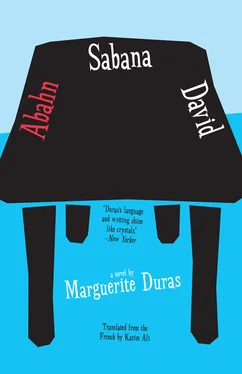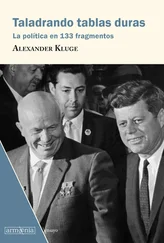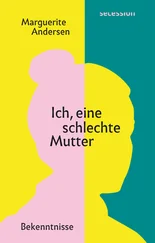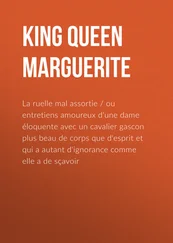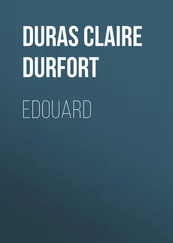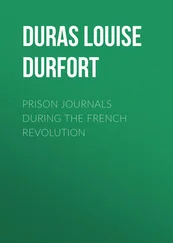“Yes,” she says. “I’m there with them now. They have a spare room. They took me in. I make the meals. Jeanne arranged it with the government. I work in the morning. For the moment I am there with them. Jeanne and I, we are David’s women, his wives.”
They fall silent for a long moment.
“You said something?” asks Abahn.
“No,” says Sabana.
“Then it was David?”
“No.”
David has a tender expression on his face, at once attentive and joyful.
“When he isn’t speaking, he’s dreaming that he’s speaking,” says Abahn.
“He’s in the process of speaking,” says the Jew.
“It’s true, if you go up close you can see it,” says Sabana.
“He’s listening, he’s answering,” says Abahn.
“Yes.”
Sabana leans over David. The Jew watches her.
“What did you say, Sabana?”
“Nothing.”
She rises. They look at her.
“What do you think?”
“Nothing.”
They are silent once more. David cries out suddenly. He does not wake, just cries out a little.
•
Lingering scraps of daylight, glimmers of frost in the direction Sabana points, that of the dark field of the dead.
The darkness in the park is peaceful. The dogs of the Jew howl no more. Nor those in the field of the dead.
Abahn sits on the ground across from where David is. Leaning against the wall, he is silent.
The Jew stands, paces through the rooms.
Sabana sits at the table, follows him in the half-dark with her eyes.
“There was another man,” says Sabana.
“He rests,” says the Jew.
He walks with an even step. He passes in front of Sabana and then David, then he turns and comes back, pacing across the place. Disappearing and reappearing. She addresses him, her voice sleepy:
“You said you knew David?”
“To whom did I say that?”
“It doesn’t matter to whom.”
“I said I knew him a little.” He walks past. She doesn’t see him anymore.
“You said you knew me?”
“No. I saw you once one morning when you were cleaning at the Staadt town hall.”
“You looked at me.”
“I look at everyone.”
He reappears. She is turned toward him. He does not pause.
“You didn’t say: I knew her, not him.”
“No.”
She is silent. She does not see what he is looking at, paused at the doorway to the other room.
“And to us,” she says, “to us they said, ‘Forget the Jew, forget what he said about liberty, forget his name too.’ You, you weren’t able to forget a ‘David’?”
“No.”
She somehow becomes alert again. He asks:
“You have forgotten the Jew?”
“If they ask us to, they say, ‘A Jew? Which one?’ You wouldn’t be able to say ‘A David? Which one?’”
“I wouldn’t say that.”
He is still once more. They can barely see one another. She asks:
“Were you in Gringo’s party before?”
“Yes.”
“You were a Gringo.”
“Yes.”
“And you weren’t able to say that you had never met a David?”
“No.”
She rises. She crosses the room slowly, going toward the door to the park, pauses there. She says:
“David could be killed if anyone were to find out he was friends with a Jew.” Her voice grows soft. “I want to understand this.”
He moves toward her. She sees him coming. She waits for him.
“That’s all false,” he says. “David is in no danger of death because he knew a Jew.”
He has come very close to her. She is looking at him still. She waits. Her eyes shine darkly in the reflection of frost on the grass.
“David is in danger of death because Gringo, on this night, needs someone to be in danger of death.” His voice as soft and intense as hers. “There, in Staadt, David, who knew me, who knew the Jew: he took David.”
They look at one another. They are silent. He asks:
“No one will ask me these questions, so why do I ask them of you?”
“Because it’s night,” says Sabana, and says nothing more.
She presses her forehead against the cold window, standing still.
“Leave me alone,” she says.
She turns. He is still there. She lifts her hand to her face but does not touch it. He says:
“You said because it’s night.”
She does not answer. She takes a step. She is against the body of the Jew, resting there. Her hand, still raised, touches his frozen face. She says:
“I take yours, I take the words of a Jew-dog.”
They are silent, entirely still.
“You want to live?”
He does not answer. And then:
“I want to live. I want to die.”
Sabana’s hand falls. She moves away. They are separate.
And the silence.
The dogs howl.
“You said because it’s night.”
“Yes. To dream of fear, we rise and wake up, we say that we dreamed, that it isn’t true.”
He walks away from her. He takes a step. She waits. He takes two steps. He walks. Instead of passing into the other room, he walks toward David. He turns on a lamp. He looks at David in the light.
Sabana moves. She takes a step, two steps, like him, she comes to look at David.
“Speak,” she says, “He will wake up if we are too quiet.”
The Jew speaks, slowly, always with the same soft tones. “He is in the Staadt Real Estate Society?”
“Yes, in that society. He is twenty-five. He’s married to Jeanne. A laborer. He loves nothing but the forest and dogs.”
She pauses, turns toward him.
“Speak. I will answer you.”
They look at each other.
“You alone know?”
“Yes. He doesn’t know.”
“Supposedly he is honest, hardworking.”
“Yes. They believe that of him. He believes it too.”
A glimmer passes across the eyes of the Jew.
“You said the forest and dogs?”
“Dogs.”
“He told me that at the café. He said, ‘I know how to speak Portuguese and how to speak with dogs.’”
•
They are apart from each other. Again the Jew walks through the house.
Sabana sits at the table, away from him, away from David, next to Abahn. She waits. Listens: someone walking. Is it the steps of the Jew she hears? Yes, those. He passes before her.
“That one they sent to Prague,” she says.
He stops. She gestures to David.
He walks again. Paces. She calls to him from where she sits, always with the same voice.
“You have been to all the capitals in the world?”
“Yes, all of them.”
“The capital is everywhere.”
“Yes.”
A dull snapping sound comes from far off in the distance, from Staadt.
“The cold,” she says.
“Yes.”
He walks. He watches David. He asks, “He is in favor of the death of Jews?”
“He doesn’t say anything about that,” says Sabana.
He walks. She no longer follows with her eyes.
“You had a job once, a wife, some children? There, where you had been, you had the right to live and to die?”
“Yes.”
“You fled? You left all that?”
“Yes. A long time ago.”
“You said one day to someone in Staadt: ‘I was hopeless, desperate.’”
“Yes.”
“After you had again left the place you had been?”
“Yes.”
“Always pursued? Killed?”
“Yes.”
Silence.
“And for that they are killing you again?”
A painful smile drags across the face of the Jew.
“Yes.”
“Desperation,” repeats Sabana.
She falls silent. And then:
“And since you came to Staadt?”
“It’s been bearable.”
“Bearable even with the danger?”
“Yes.”
He paces still. She watches him.
“Where you’re always about to leave?”
“Wherever you are, I think, you are on your way.”
Читать дальше
